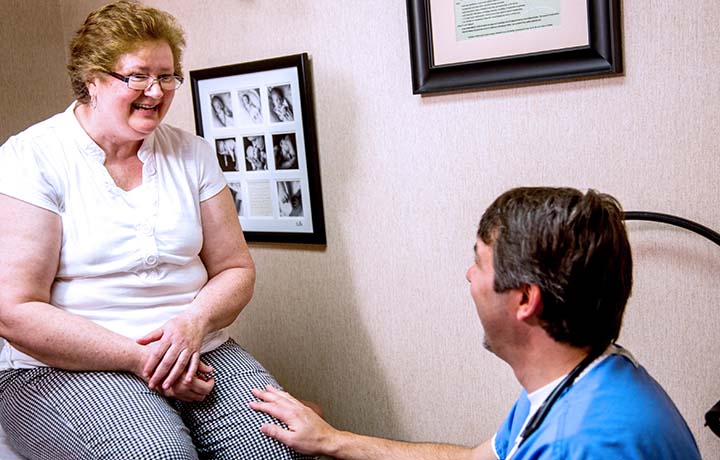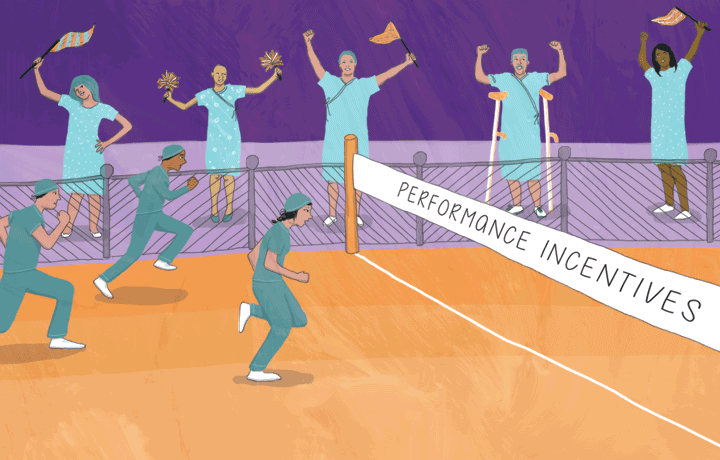Article
When money isn't enough to motivate doctors
By Gale Pryor | April 5, 2017

If financial rewards don't induce doctors to practice differently, what does?
Researchers have analyzed top performers among the athenahealth network of 88,000 providers to develop a theory of operational excellence, identifying best practices to support financial performance and clinical outcomes. And they found that many high-performing healthcare organizations don't rely merely on financial compensation to drive behavior.
As a baseline, an organization's financial incentives and compensation models need to align with its strategic goals, says Jessica Sweeney-Platt, executive director of research at athenahealth. Healthcare practices can start by eliminating models that actively compete with a value-based strategy — for instance, by penalizing physicians financially when they send patients to nurse practitioners.
But "truly excellent groups don't let the conversation stop there," Sweeney-Platt says. "They paint a vision of quality, patient care, and access‚ then make sure the incentive structure rewards behaviors that get them there."
Key to that, some high performers say, is understanding not just physicians' goals, but their motivations. And they note that more effective incentive programs — leading to a new way of practicing medicine — may hinge on some very old principles of behavioral economics:
Expectations and feedback
Successful medical systems set clear expectations for performance and tend to tie compensation to meeting quality metrics. Still, many find that those payments arrive too late to drive immediate behavior on the road to quality.
"It's all filtered through health plan reporting, CMS reporting," says Martha Mastroberti, manager of healthcare informatics at Valley Medical Group in western Massachusetts, "and moneys don't seem logically connected to those things. It's whatever is left over at the end."
So at Valley, each physician receives a monthly "snapshot" of where he or she stands in meeting metrics. Real-time feedback on individual progress — rather than end-of-year payments — fuels the work in quality care.
Simplicity
Valley Medical Group also understands the behavioral economics principle of "choice overload." System leaders focus on a minimum set of measures — only those that matter most to their physicians.
"We pick five or six measures of preventive care, chronic care, pediatric, and adult," says Mastroberti. "And we say, 'These are the ones we're going to care about.'"
Competition
"Relative social rank" — beating the other guy — is a powerful motivator among physicians, behavioral economists say. Because doctors care more about how they compare to colleagues than to national benchmarks, many high performers practice what could be called radical data transparency. They openly share individual performance data with all providers — and often staff as well.
At Farmington Family Practice, a 10-provider group in New Mexico, posting unblinded data for all to see encourages friendly competition among clinicians.
"Doctors want to see their numbers up or above their peers," says practice administrator Wayne Gosar.
Clinicians learn from each other informally, he says, comparing data in the hallways and lunchroom. They have even started a football pool of sorts, based on quality measures.
"They say, 'If you get a bigger percentage, I'll take you out to lunch,'" Gosar says. “And that's actually been more effective than some of the other things that we've done."
Recognition
Calais Regional Hospital serves 11,000 patients on the border of Maine and Canada. To serve every patient possible in the sparsely populated region, “we have to shine," says Theresa Brown, director of practice management.
So when Calais clinicians meet quality measures, the hospital recognizes their achievement on Get Better Maine, a public website listing satisfaction, safety, EHR utilization, and quality scores for the state's physicians.
“Providers and staff wanted to start seeing good scores next to our name, because when patients do have an opportunity to choose a provider, they want one that is doing a great job," Brown says.
Sharing physicians' achievements also helps to boost the hospital's community relations, Brown says.
"We all said, 'Yay, you did a great job,' and we make a big deal out of it, but then we actually market it," she says. "Now the whole community knows it, and that inflates the feeling of recognition. We have taken that bright spot and really illuminated it for the community at large."
Outcomes
In Fresno, California, the Saint Agnes Medical Foundation quality team doesn't talk about risk or payments with physicians. Instead, system leaders focus on the impact of value-based care on patients' lives.
"Quality does take time, quality does cost money," says Erin Woo, the system's EHR specialist. "The long-term payoff, though, is patient retention, patient recruitment, and provider satisfaction. Physician satisfaction is a huge result of being able to deliver quality medicine."
Helping patients, it turns out, can be a physician's most powerful incentive.
Gale Pryor is a senior writer for athenaInsight.






